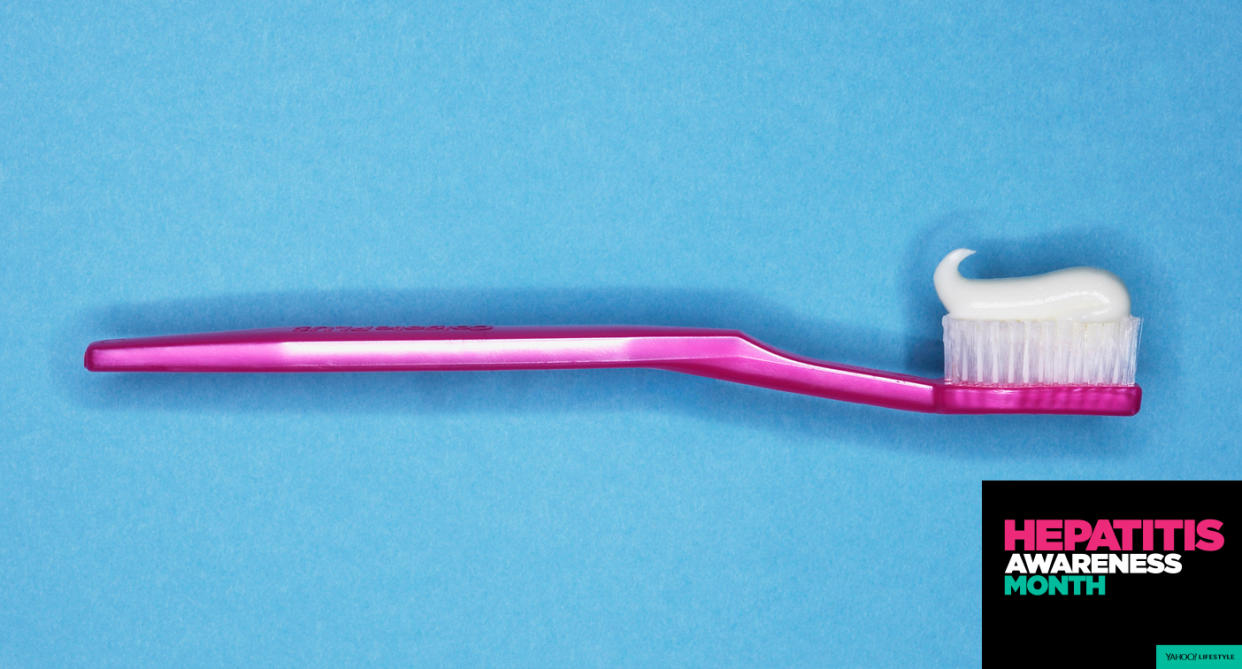Do you ever share toothbrushes? You could be exposing yourself to a disease

Hepatitis C affects 71 million people around the world, according to the World Health Organization, and the infection can cause serious complications, such as cirrhosis of the liver or liver cancer.
But the liver infection doesn’t just affect people in less developed countries: More than 3 million people in the U.S. have hepatitis C, per the U.S. Department of Health and Human Services (HHS), and about 17,000 new infections occur each year.
Hepatitis C is brought on by the hepatitis C virus, and it can cause anything from a mild illness that lasts a few weeks to a serious, chronic illness that attacks a patient’s liver, according to HHS. Unfortunately, about 75 to 85 percent of people who contract hepatitis C will have a chronic infection.
People become infected with hepatitis C when blood contaminated with the virus gets into their bloodstream, William Schaffner, MD, an infectious disease specialist and professor at the Vanderbilt University School of Medicine, tells Yahoo Lifestyle. If you test positive for hepatitis C, you’ll likely be treated with antiviral medications to try to clear the virus from your body, he explains.
There is no vaccine to prevent hepatitis C, and it’s most often transmitted through injection drug use, infectious disease expert Amesh A. Adalja, MD, senior scholar at the Johns Hopkins Center for Health Security, tells Yahoo Lifestyle. However, it’s possible for other people to contract the infection too, and in surprising ways.
Here are just a few ways you can contract hepatitis C:
Sharing razors and toothbrushes
The Centers for Disease Control and Prevention (CDC) specifically warns against sharing personal care items like razors and toothbrushes. “If someone who is infected has blood on their toothbrush and you use it, you could technically get infected,” Adalja says. The overall risk is low, the CDC says, but it’s possible. Still, “you should not share razors and personal hygiene items,” Adalja notes.
From infected manicure and pedicure tools
Given that hepatitis C is transmitted through blood, a few things would have to happen here for you to contract the infection, Carlos Romero-Marrero, MD, a hepatologist at the Cleveland Clinic specializing in hepatitis and liver disease, tells Yahoo Lifestyle: Someone who was infected with hepatitis C used the manicure/pedicure tools before you, the tools were not properly sanitized, and you had a cut on your skin.
It sounds implausible, but it’s happened before. “There are some case reports of this happening,” Romero-Marrero says. “However, it’s still low risk.” He recommends asking the nail salon you visit how they sterilize their instruments before getting a mani/pedi to lower your risk.
Getting a tattoo or piercing from an infected needle
This was more of an issue for people who got tattoos and piercings in the ’60s through the ’90s, when tattoo and piercing parlors weren’t as well regulated, Romero-Marrero points out. Now, most reputable tattoo parlors and piercing studios are certified by the state where they operate. “If you’re in a certified tattoo parlor or piercing studio, it shouldn’t be a risk,” Romero-Marrero says. However, getting a tattoo or piercing at a party, on the street, from a friend, or from an unlicensed studio is not a good idea. “They’re not educated on how to sterilize the instruments,” he says. “This virus can stay on instruments for some time.”
Mother-to-child transmission
If a mother has hepatitis C, she can pass it on to her baby during childbirth, according to the CDC. Experts aren’t totally sure how the virus gets to the baby from the mom, but it’s assumed that it must be due to sharing of blood, Schaffner says.
Having unprotected sex with someone who is infected
Having unprotected sex with someone with hepatitis C raises your risk of contracting the infection, the CDC says. However, it’s higher for HIV-infected men who have sex with men, the organization points out. It’s also possible for infected women to pass on the virus by having sex during their period, according to the Mayo Clinic.
Overall, your risk of contracting hepatitis C from these sources is low compared with your risk if you’re an injection drug user, Adalja says. Still, it’s possible.
Read more from Yahoo Lifestyle:
Bathroom hand dryers are secretly gross, according to new study
New study confirms vaginal hygiene products do more harm than good
2-year-old girl’s quick thinking might have saved her mom’s life
Follow us on Instagram, Facebook, and Twitter for nonstop inspiration delivered fresh to your feed, every day.
